family
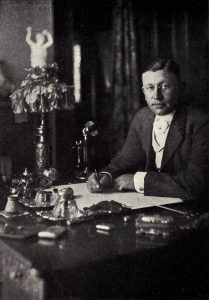 I think that most of us have engaged in a wager or two…probably more in fact. For most of us gambling brings little or no gain, and instead, usually loss. That is what it would bring for Horatio Nelson Jackson, as he, to his own folly, accepted a $50.00 bar bet, back in 1903. At that time, there were roads for the cars that were coming out, but they were…well, rough, and that’s an understatement. Unpaved dirt roads are notoriously dusty, rutted, and muddy in the rain. Most people, at that time, considered the automobile a passing novelty, too unreliable to survive a trip across America, but Jackson argued that they were wrong. As often happens in these barroom discussions, someone called Jackson out on his theory. He bet Jackson that he could not drive a car from San Francisco, California to New York City, New York in 90 days. Jackson accepted the challenge.
I think that most of us have engaged in a wager or two…probably more in fact. For most of us gambling brings little or no gain, and instead, usually loss. That is what it would bring for Horatio Nelson Jackson, as he, to his own folly, accepted a $50.00 bar bet, back in 1903. At that time, there were roads for the cars that were coming out, but they were…well, rough, and that’s an understatement. Unpaved dirt roads are notoriously dusty, rutted, and muddy in the rain. Most people, at that time, considered the automobile a passing novelty, too unreliable to survive a trip across America, but Jackson argued that they were wrong. As often happens in these barroom discussions, someone called Jackson out on his theory. He bet Jackson that he could not drive a car from San Francisco, California to New York City, New York in 90 days. Jackson accepted the challenge.
Jackson asked Sewall Crocker to accompany him on the trip. Crocker was a 22 year old former bicycle racer and a gasoline engine mechanic. Jackson was a doctor who had given up his medical practice after a bout of tuberculosis. At this point, he was looking for adventure. Crocker suggested that the former physician purchase a used 20 horsepower Winton touring car for the treacherous journey, so Jackson did, and named it the “Vermont.” Then on May 23, 1903, the two men hopped in and headed east. They had packed sleeping bags, food, and other camping supplies. Previous cross country trips had all ended in failure, and it was likely that this one would suffer a similar fate, but this was to be the first successful cross country road trip.
Horatio Jackson had little driving experience, and no mechanical knowledge, but he had his wife’s inherited fortune, and apparently that was burning a hole in he pockets. The roads he was to be on had no road signs, 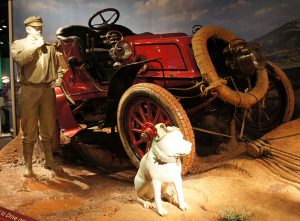 there was no GPS, and more importantly, there were no gas stations…plus the fact that automobiles were prone to breakdowns. The Vermont was no different, the first pit stop was just 15 miles into the trip when they blew a tire. There would be many others. Nevertheless, Jackson would win his bar bet and the $50.00 when he rolled into New York City. The mud caked Vermont, crawled down Manhattan’s deserted Fifth Avenue at 4:30 am on Sunday, July 26. The approximately 4,500 mile journey had taken 63 days, 12 hours and 30 minutes, amazing considering all the problems. So what then was the road trip folly? Just this…Jackson had won his wager with nearly a month to spare, but it cost him $8,000 in the process. I guess he could always say he made the trip.
there was no GPS, and more importantly, there were no gas stations…plus the fact that automobiles were prone to breakdowns. The Vermont was no different, the first pit stop was just 15 miles into the trip when they blew a tire. There would be many others. Nevertheless, Jackson would win his bar bet and the $50.00 when he rolled into New York City. The mud caked Vermont, crawled down Manhattan’s deserted Fifth Avenue at 4:30 am on Sunday, July 26. The approximately 4,500 mile journey had taken 63 days, 12 hours and 30 minutes, amazing considering all the problems. So what then was the road trip folly? Just this…Jackson had won his wager with nearly a month to spare, but it cost him $8,000 in the process. I guess he could always say he made the trip.
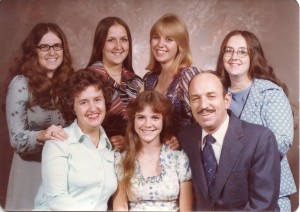 When we think of Blended Families, we think of two people who have both been divorced, who have children, that marry each other, and become a blended family. That is one type of blended family for sure, just like the old movie, “Yours, Mine, and Ours.” But in reality, every family is a blended family. I suppose people, who have never been divorced, would argue that point with me, but it is true nevertheless. If you think about it there is no other way to have families, except blending.
When we think of Blended Families, we think of two people who have both been divorced, who have children, that marry each other, and become a blended family. That is one type of blended family for sure, just like the old movie, “Yours, Mine, and Ours.” But in reality, every family is a blended family. I suppose people, who have never been divorced, would argue that point with me, but it is true nevertheless. If you think about it there is no other way to have families, except blending.
In my family, starting with my four sisters and me, we all started out as Spencer girls, but we did not carry that name into adulthood. We now have the names Masterson, Schulenberg, Reed, Stevens, and Hadlock. We also have Beach, Harman, Balcerzak, Davidson, Cossabone, Chase, Renville, Reynolds, Thompson, Spethman, Petersen, Royce, Spicer, Franco-Arizola, Smiley, Sawdon, Carroll, and Moore, and that is just on my side of my family, and just so far. On Bob’s side, the Schulenberg kids have added, Cook, Spencer, Parmely, Franklin, Petersen, Royce, Moore, Griffith, Wages, Eighmy, Birky, and Iverson. If that isn’t family blending…well, I don’t know what is. I just don’t think that type of blending is what people had in mind when they talk about blended families, but this type of family blending takes place far more often that the other type. It happens with every marriage.
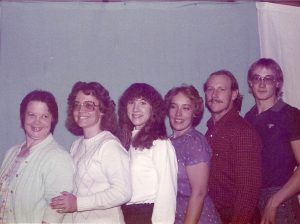 Bob and I have laughed about the fact that after years of being married, we now find out that we are distant cousins, but when you think about it, with all of the blending going on in this world, what is the likelihood that we would never marry a distant cousin. Pretty slim I’d say. In fact, I think that if I looked back in the ancestry of any random couple, I would find a cousinship somewhere back there. Of course, I wouldn’t even have to look very far, because the whole thing started with Adam and Eve, so since we are all related back there, is just stands to reason that the connections on the way back to Adam and Eve would also have connections. So, the next time you think about a blended family, you might think of your own family blending.
Bob and I have laughed about the fact that after years of being married, we now find out that we are distant cousins, but when you think about it, with all of the blending going on in this world, what is the likelihood that we would never marry a distant cousin. Pretty slim I’d say. In fact, I think that if I looked back in the ancestry of any random couple, I would find a cousinship somewhere back there. Of course, I wouldn’t even have to look very far, because the whole thing started with Adam and Eve, so since we are all related back there, is just stands to reason that the connections on the way back to Adam and Eve would also have connections. So, the next time you think about a blended family, you might think of your own family blending.
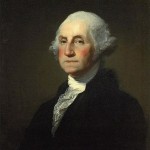
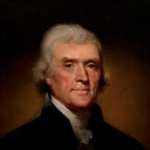 Over the years, my family and I have spent many vacations and weekend trips, especially the 4th of July, in the Black Hills of South Dakota. We love the area, and it’s close enough to home to get there even for a three day weekend. Bob and I mostly love to hike the many trails there, as opposed to the tourist attractions, since we have been there many times. Nevertheless, there are a few places that we usually go and things we usually do, like the 1880 Train, Keystone, and of course, Mount Rushmore. Being patriots, Bob and I are very much impressed by the carvings on Mount Rushmore. I think most people know that four United States Presidents, who were instrumental in making this country great, are carved in the granite face of the mountain. If you go there, you will see, President George Washington, President Thomas Jefferson, President Theodore Roosevelt, and President Abraham Lincoln, looking out across the land, making a majestic tribute to these men and to our nation as a whole. These four presidents were chosen because they represent the first 130 years of American history well. These presidents were selected by Borglum because of their role in preserving the Republic and expanding its territory. I can’t go there, or even drive by the monument, without feeling a deep sense of pride
Over the years, my family and I have spent many vacations and weekend trips, especially the 4th of July, in the Black Hills of South Dakota. We love the area, and it’s close enough to home to get there even for a three day weekend. Bob and I mostly love to hike the many trails there, as opposed to the tourist attractions, since we have been there many times. Nevertheless, there are a few places that we usually go and things we usually do, like the 1880 Train, Keystone, and of course, Mount Rushmore. Being patriots, Bob and I are very much impressed by the carvings on Mount Rushmore. I think most people know that four United States Presidents, who were instrumental in making this country great, are carved in the granite face of the mountain. If you go there, you will see, President George Washington, President Thomas Jefferson, President Theodore Roosevelt, and President Abraham Lincoln, looking out across the land, making a majestic tribute to these men and to our nation as a whole. These four presidents were chosen because they represent the first 130 years of American history well. These presidents were selected by Borglum because of their role in preserving the Republic and expanding its territory. I can’t go there, or even drive by the monument, without feeling a deep sense of pride 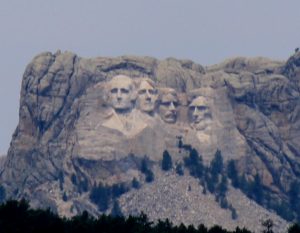 and awe. It’s almost like you can feel history when you are there.
and awe. It’s almost like you can feel history when you are there.
On March 5, 1925, the Governor of South Dakota, Carl Gunderson signed the Mount Harney bill, which would allow the carving of a monument in Custer State Park. The mountain was chosen as the sight for the carvings by Gutzon Borglum, the artist in charge of the project, and really the visionary of what it would become. It was dedicated on October 1, 1925, as the sight for the carving that South Dakota state historian Doane Robinson first dreamed of seeing in the Black Hills, back in 1923. On October 7, 1927, the actual carving began. The project took 14 years and 400 men to complete the carving of the mountain. The conditions were harsh and dangerous, yet no one died during the project. Over 90% of Mount Rushmore was carved using dynamite. That is probably one of the facts about Rushmore that most people find most intriguing. The blasts removed approximately 450,000 tons of rock. If you walk on the President’s Trail, you can still see the drill marks used for the dynamite. The fine details were finished with jackhammers and hand chisels. It really isn’t what you would have expected at all.
George Washington was dedicated on July 4, 1930. Then work began on Thomas Jefferson, but many people thought it was Martha Washington for a time…a drawback of an artists work being done so much in the 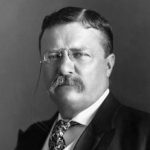
 public eye. Thomas Jefferson was dedicated on August 30, 1936. Abraham Lincoln was dedicated on this day, September 17, 1937, and Theodore Roosevelt was dedicated on July 2, 1939. The Hall of Records was never finished because of dangerous working conditions. Gutzon Borglum died suddenly on March 6, 1942, and the work on the mountain was finished by his son, Lincoln Borglum. With the onset of the US involvement in World War II, the mountain was declared complete on October 31, 1941. So ended the work on the mountain, and I really never get tired of hearing the story.
public eye. Thomas Jefferson was dedicated on August 30, 1936. Abraham Lincoln was dedicated on this day, September 17, 1937, and Theodore Roosevelt was dedicated on July 2, 1939. The Hall of Records was never finished because of dangerous working conditions. Gutzon Borglum died suddenly on March 6, 1942, and the work on the mountain was finished by his son, Lincoln Borglum. With the onset of the US involvement in World War II, the mountain was declared complete on October 31, 1941. So ended the work on the mountain, and I really never get tired of hearing the story.

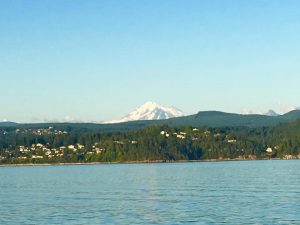 No wedding brings with it the guarantee of a lifelong marriage. That is up to the couple who are in the marriage, and it takes two people to make a successful marriage. The years fly by, things in the couple’s life change, and sometimes people decide to move to a new place. It may not be the way other people expected their life to go, but as long as the couple agrees on the new journey, it will work out to bring a beautiful life. I have had to be one of those parents who saw the life of her daughter and her family in a very different way than it turned out to be, and sometimes that is hard for me, because I miss them very much, but they are so happy living in northwestern Washington state, that I can’t help but feel happy for them.
No wedding brings with it the guarantee of a lifelong marriage. That is up to the couple who are in the marriage, and it takes two people to make a successful marriage. The years fly by, things in the couple’s life change, and sometimes people decide to move to a new place. It may not be the way other people expected their life to go, but as long as the couple agrees on the new journey, it will work out to bring a beautiful life. I have had to be one of those parents who saw the life of her daughter and her family in a very different way than it turned out to be, and sometimes that is hard for me, because I miss them very much, but they are so happy living in northwestern Washington state, that I can’t help but feel happy for them.
My daughter, Amy Royce and her husband, Travis were married almost 20 years when they decided to pack up and move. They had spent the first 20 years of their marriage here in Casper, Wyoming, and I will be forever grateful to them for doing that, because it gave us the chance to really know their children, Shai and Caalab, and to spend time with all of them. I think that, while it is always hard to have your grandchildren living far away, it is easier when they were close while they were growing up, so they know their grandparents and how much we love them.
Amy has always loved the rain and the beach, and since she visited the Pacific Northwest as a Senior Trip, she has been in love with that area. The funny thing is that since she and Travis moved there, we have had more rain than we used to. These days, Amy and I have sort of a standing joke going. When it rains here, I sent her a text telling her it’s an Amy Day, to which she answers…”Send some my way.” Trying to be cooperative, I tell her that I will, but since it will have to get to her by way of Florida and Japan, it could take a while. Funny thing about that…Amy loves rain so much that she didn’t even care how long it took, just that it was on it’s way.

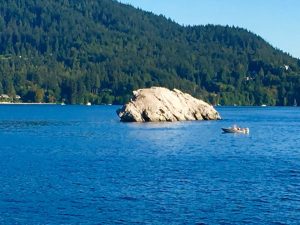
Amy and Travis are so happy living in their new home and their new state, that I can’t help but be happy for them too. Of course, I wish I had the ability to beam myself over there more often, but I don’t so Facebook, telephone, Snapchat, and texting are the modes of communication for now. I’m just happy that they love living in their beautiful area. Today is Amy and Travis 21st Wedding Anniversary. The years surely do fly by. Happy Anniversary Amy and Travis!! We love you!!
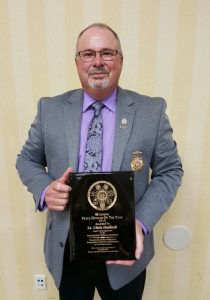 When someone becomes a police officer, they begin a career of service to their community. They run in when others are running out. They face the guns pointed at them, instead of hiding under a desk, like many of us would do. Still, all that does not really determine what kind of a police officer they will become. When my brother-in-law, Chris Hadlock, and my sister, Allyn were living in Fort Morgan, Colorado, Chris was in sales, but he knew that that was not what he wanted to do with his life. He told Allyn that he just didn’t want to do sales anymore. It wasn’t rewarding. He said that he didn’t think he could be a doctor, but he wanted to help people…he wanted to be a police officer. After the initial shock, and yes to a degree fear, wore off, Allyn agreed that it was what he needed to do. So began a long and rewarding career in law enforcement.
When someone becomes a police officer, they begin a career of service to their community. They run in when others are running out. They face the guns pointed at them, instead of hiding under a desk, like many of us would do. Still, all that does not really determine what kind of a police officer they will become. When my brother-in-law, Chris Hadlock, and my sister, Allyn were living in Fort Morgan, Colorado, Chris was in sales, but he knew that that was not what he wanted to do with his life. He told Allyn that he just didn’t want to do sales anymore. It wasn’t rewarding. He said that he didn’t think he could be a doctor, but he wanted to help people…he wanted to be a police officer. After the initial shock, and yes to a degree fear, wore off, Allyn agreed that it was what he needed to do. So began a long and rewarding career in law enforcement.
Chris became a deputy sheriff in 1990, when he joined the Natrona County Sheriff’s Department. After a time, he had the opportunity to join the Casper Police Department, and in 1997, he became a patrolman with the CPD. Chris loved his career. He was in his element and he was very good at what he did. I had the opportunity on several occasions, to ride along with him, and I watched as he was able to quickly de-escalate a situation, and in the end, the person he was arresting was not only cooperative, but in some cases, thanked him for making the arrest as painless as possible. Now, as we all know, not every situation works out that well, but those that did were truly amazing. Over the years, Chris has 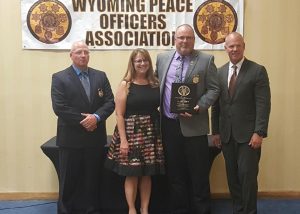 tested for and been promoted to Sergeant and then, Lieutenant, which is the rank he currently holds. He has been a hiring and training officer, shift supervisor, and is currently over Investigations, Victim Services, Operations Support Team, and Property Evidence.
tested for and been promoted to Sergeant and then, Lieutenant, which is the rank he currently holds. He has been a hiring and training officer, shift supervisor, and is currently over Investigations, Victim Services, Operations Support Team, and Property Evidence.
Last night, the culmination of all his years of service, was recognized by the Wyoming Peace Officers Association at their annual banquet, held in Cheyenne, Wyoming. We, his family are so proud to announce that Chris Hadlock was awarded the Wyoming Peace Officer of the Year award. To receive this award, the candidate must be nominated. Chris was the nominee for the Casper Police Department, and based on his long standing law enforcement career and his continual service to the public, first as a deputy and then as a police officer, Chris won the award. He and Allyn had their picture taken with the Governor of Wyoming, Matt Meade, and the president of the Wyoming Peace Officers Association, Tom Stoker. Chris also received an engraved plaque, and will be receiving an engraved revolver. Then, in May, he and Allyn will travel to Washington DC for National Police Week. They will attend the National Peace Officers Memorial Service which commemorates fallen officers.
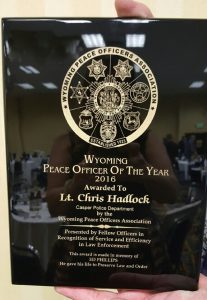
Chris says that this is such an honor, and he feels very humbled by it. We can’t think of anyone who could possibly deserve it more. Once the decision was made to become a police officer, Chris never looked back. It was his dream career and he would never think of doing anything else. For him, it isn’t just a career. It goes back to that original desire, “I want to help people.” A police officer has parts of his job that are necessary, but not really fun, such as issuing citations, but when you are the first on the scene at an accident, and someone is in serious need, and you save a life…it just doesn’t get better than that. When you are instrumental in getting people out of a dangerous situation, and lives are saved…that’s what it’s all about. That is what Chris meant when he said he wanted to help people, and that is what he has done. Congratulations to Lieutenant Christopher Hadlock, Wyoming’s Peace Officer of the Year!! We are so very proud of you!! Thank you for your years of service!!
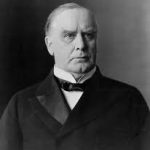 I find it very sad to think that if a person had some ailments or injuries in this day and age, they would likely have lived through the episode, but in days gone by, and for President McKinley, that was not to be the case.
I find it very sad to think that if a person had some ailments or injuries in this day and age, they would likely have lived through the episode, but in days gone by, and for President McKinley, that was not to be the case.
On September 6, 1901, while standing in a receiving line at the Pan-American Exposition in Buffalo, New York, McKinley was approached by Leon Czolgosz, a Polish-American anarchist carrying a concealed .32 revolver in a handkerchief. Czolgosz shot McKinley twice at close range. One bullet deflected off a suit button, but the other entered his stomach, passed through the kidneys, and lodged in his back. When he was operated on, doctors failed to find the bullet. That in and of itself was a very 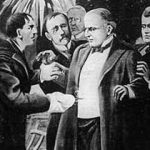 serious situation, but I believe it would have been survivable. Unfortunately for President McKinley, the doctors of that time had few, if any antibiotics to fight infection, and gangrene soon spread throughout the president’s body. McKinley died eight days later, on September 14, 1901. Czolgosz was convicted is of murder and executed soon after the shooting.
serious situation, but I believe it would have been survivable. Unfortunately for President McKinley, the doctors of that time had few, if any antibiotics to fight infection, and gangrene soon spread throughout the president’s body. McKinley died eight days later, on September 14, 1901. Czolgosz was convicted is of murder and executed soon after the shooting.
These days, there have been a number of people who have had injuries far more grave than President McKinley had, and yet they have come through with flying colors. I think it is irrelevant what a person’s politics are or whether you think President McKinley was a good president or a bad president, because this really isn’t about politics at all. The reality is that this man died largely because of a lack of modern medicines that could 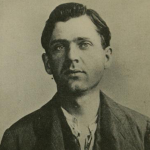 have easily cured the gangrene he had from the shooting, or in most cases, prevented it all together.
have easily cured the gangrene he had from the shooting, or in most cases, prevented it all together.
None of us likes to pay for the cost of some of the life-saving drugs that have been developed, but it is partly that cost that helps to pay for the research that goes into these new medicines. Whether we pay for them by donations before development or cost after development, really makes no difference. I know many people think that the drug companies gouge the patient, and I suppose that could be true to an extent, but which one of us has what it takes to find a medicine that cures some of the diseases we can cure today, that were a death sentence in years gone by?
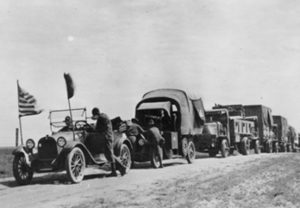
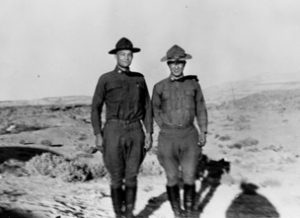 Have you ever wondered how the Interstate road system got started? People didn’t just wake up one day and envision a great system of roads that could transport us from one side of the country to the other. There had to be some reasons to do such a thing, right? Well, there was. In 1919, Dwight Eisenhower was feeling a bit disenchanted with life, because his wife and infant son were living 1,500 miles away in Denver, while he was a 28 year old lieutenant colonel stationed at Maryland’s Camp Meade. He was bored and miserable, and so he and his fellow soldiers wasted the hours playing bridge and complaining about being kept stateside during World War I. What do people do when they need to break through the boredom…what else, a road trip!!
Have you ever wondered how the Interstate road system got started? People didn’t just wake up one day and envision a great system of roads that could transport us from one side of the country to the other. There had to be some reasons to do such a thing, right? Well, there was. In 1919, Dwight Eisenhower was feeling a bit disenchanted with life, because his wife and infant son were living 1,500 miles away in Denver, while he was a 28 year old lieutenant colonel stationed at Maryland’s Camp Meade. He was bored and miserable, and so he and his fellow soldiers wasted the hours playing bridge and complaining about being kept stateside during World War I. What do people do when they need to break through the boredom…what else, a road trip!!
Eisenhower heard that two volunteer tank officers from Camp Meade were needed to participate in a coast to coast military convoy to San Francisco. It was the perfect adventure, so Eisenhower immediately volunteered his services. Granted, it wasn’t the thrill of battle that the young soldier had planned to spend his time in the service engaging in, but it was far better than playing bridge. Little did he know just how grueling the trip would be. Remember that these were the early years of the automobile, and drivers were just as likely to encounter roads to nowhere, as they were the open road. Highways were not usually paved. Dirt roads could be a muddy mess or so dry that they were either dust clouds or full of ruts. Sixty miles an hour was unheard of and many roads could only be driven at the pace of a brisk walk. As a means of transporting military equipment quickly from one coast to the other…this system left much to be desired, in fact it was a miserable excuse for a road system at all. Something had to change.
Fast forward a few years…37 years to be exact, and you will find then President Dwight D Eisenhower signing the Federal-Aid Highway Act of 1956 privately, without ceremony, on June 29, 1956. The system would take decades to build, and in reality is always under construction. The project was the largest public works project in American history. The project would pour billions of dollars into the nation’s economy all over the country, putting many people to work. Today, it continues to be a boon to the economy because of the maintenance and repairs needed to keep it going.
In 1990, as a tribute to Eisenhower, on the centennial of his birth, President George H W Bush redesignated the 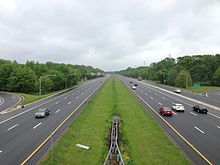
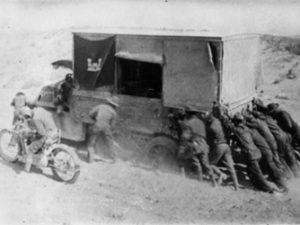 interstate system as the Dwight D Eisenhower National System of Interstate and Defense Highways. Interstate 80, would be quite familiar to Eisenhower. It starts just across the Hudson River from New York City, then goes through New Jersey and Pennsylvania, and into Ohio, where it follows generally the route of the 1919 Army convoy to San Francisco that had sparked Eisenhower’s interest in such a system in the first place.
interstate system as the Dwight D Eisenhower National System of Interstate and Defense Highways. Interstate 80, would be quite familiar to Eisenhower. It starts just across the Hudson River from New York City, then goes through New Jersey and Pennsylvania, and into Ohio, where it follows generally the route of the 1919 Army convoy to San Francisco that had sparked Eisenhower’s interest in such a system in the first place.
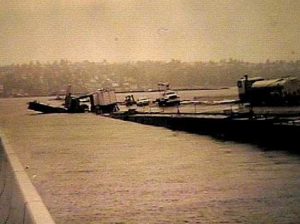 Since my daughter, Amy Royce and her family moved to Western Washington State, I keep coming across historic facts about the area. Of course, they were there before, but probably just didn’t grab my interest then. One such fact is that Seattle was home to the world’s first floating concrete bridge. Washington governor Clarence Martin and Lacey V Murrow, the Washington Toll Bridge Authority director, broke ground on the Lake Washington Bridge in December of 1938. The Lake Washington Floating Bridge was also known as the Mercer Island Bridge, it spanned Lake Washington from Seattle on the west to Bellevue to the east. The bridge was renamed Murrow Bridge in honor of Lacey Murrow in 1967. The bridge was a project financed by the Public Works Administration to give work to
Since my daughter, Amy Royce and her family moved to Western Washington State, I keep coming across historic facts about the area. Of course, they were there before, but probably just didn’t grab my interest then. One such fact is that Seattle was home to the world’s first floating concrete bridge. Washington governor Clarence Martin and Lacey V Murrow, the Washington Toll Bridge Authority director, broke ground on the Lake Washington Bridge in December of 1938. The Lake Washington Floating Bridge was also known as the Mercer Island Bridge, it spanned Lake Washington from Seattle on the west to Bellevue to the east. The bridge was renamed Murrow Bridge in honor of Lacey Murrow in 1967. The bridge was a project financed by the Public Works Administration to give work to 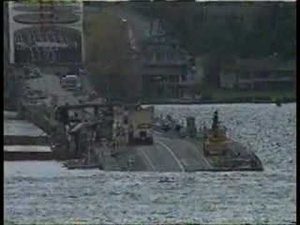 unemployed Washingtonians and to make the towns across the lake from Seattle more accessible to suburban development.
unemployed Washingtonians and to make the towns across the lake from Seattle more accessible to suburban development.
When the finished bridge opened in 1940, the Seattle Times called it “the biggest thing afloat.” It’s hard to imagine that 100,000 tons of steel, could float on more than 20 hollow concrete pontoons, and carry 5,000 cars per day. By 1989 the number of cars grew to 10,000 cars. Since the bridge would become such an important road between the two cities, the flood of November 1990 was especially devastating, in that it completely destroyed the bridge. While the bridge was closed for repairs, construction workers punched giant holes in the pontoons that kept it afloat and went home for the weekend. 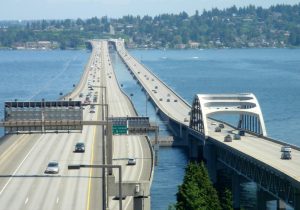 A few days of rain and high winds filled the pontoons with water, and the broken bridge sank.
A few days of rain and high winds filled the pontoons with water, and the broken bridge sank.
This would not be an easy fix. As the pontoons filled with water and the bridge sank, it pulled about a half a mile of highway into the lake. There was simply no way to fix it. The bridge would have to be rebuilt from scratch. In the end, it would take three years to rebuild at a total cost of $93 million. When the bridge reopened, it would complete the coast to coast Interstate 90. On this day, September 12, 1993, the rebuilt Lacey V Murrow Bridge opened. This bridge was the east bound lane of I-90 from Seattle to Bellevue. The westbound lane is on the Homer M Hadley Bridge, which was not destroyed by the flood.
 Fifteen years ago today, Americans were greeted with horror, as terrorism split the atmosphere of safety we had long enjoyed around our nation. I think most Americans had become comfortable, and even complacent about national security. Life was going along at almost a lazy Sunday afternoon pace. We were like small town kids, who thought that nothing ever happens in our town. How very wrong we were. Our world was about to be turned upside down.
Fifteen years ago today, Americans were greeted with horror, as terrorism split the atmosphere of safety we had long enjoyed around our nation. I think most Americans had become comfortable, and even complacent about national security. Life was going along at almost a lazy Sunday afternoon pace. We were like small town kids, who thought that nothing ever happens in our town. How very wrong we were. Our world was about to be turned upside down.
When the first plane hit the World Trade Center, I think most people thought it was a tragic accident. We simply couldn’t fathom the idea that a terrorist would be so horribly cruel as to hijack a plane full of innocent people and fly it straight into a building full of more innocent people. And yet, to our horror, that is exactly what these terrorists did. They operated the planes with no mercy and no feelings. They did not care about the lives they were taking or even about their own lives…in fact, they thought they were heroes for their actions, and that there would be great rewards in Heaven for them. Their complete shock as they entered Hell, must have been devastating.
 Their actions left our nation is shock and disbelief. We watch as the devastation unfolded before us, growing worse by the moment, our hearts and minds were assaulted, yet we could not look away. We watched, hoping that the people on the top floors could be saved…even after they began to fall or jump from the building, because the heat was more than they could take. We felt sick with each and every thud. We prayed over the rescuers, that they would be successful in getting people out, and that they would come out too. We watched in stunned disbelief as the towers fell, praying that after the first tower fell, that somehow, the second would remain standing…until it also fell. We became angry at the people who had done this, without provocation. Pure hate, of our beliefs, our prosperity, and our liberties, and that drove them to attack us.
Their actions left our nation is shock and disbelief. We watch as the devastation unfolded before us, growing worse by the moment, our hearts and minds were assaulted, yet we could not look away. We watched, hoping that the people on the top floors could be saved…even after they began to fall or jump from the building, because the heat was more than they could take. We felt sick with each and every thud. We prayed over the rescuers, that they would be successful in getting people out, and that they would come out too. We watched in stunned disbelief as the towers fell, praying that after the first tower fell, that somehow, the second would remain standing…until it also fell. We became angry at the people who had done this, without provocation. Pure hate, of our beliefs, our prosperity, and our liberties, and that drove them to attack us.
As the day went on, we watched in horror as more information came out. We knew that there were going to be 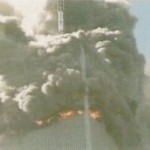 many people died, but still we watched as they dug through the rubble. We thought there would suddenly be people found alive in that rubble. As time went on, we knew that there wouldn’t be huge numbers of survivors. In the end, only twelve people were found alive after the towers fell. After a couple of days, we knew there would be no more, still we could not look away. We had to watch…had to know. As each lost one was found…we cried right along with their families. Then came the worst horror of all…finding out that some people would never be found. The fires had been so hot that their bodies were cremated. That added more horror to our thoughts. It was something we just couldn’t fathom, just like we could not fathom that 15 years later, that day would still be as vivid in our memories as it was on the day we were attacked.
many people died, but still we watched as they dug through the rubble. We thought there would suddenly be people found alive in that rubble. As time went on, we knew that there wouldn’t be huge numbers of survivors. In the end, only twelve people were found alive after the towers fell. After a couple of days, we knew there would be no more, still we could not look away. We had to watch…had to know. As each lost one was found…we cried right along with their families. Then came the worst horror of all…finding out that some people would never be found. The fires had been so hot that their bodies were cremated. That added more horror to our thoughts. It was something we just couldn’t fathom, just like we could not fathom that 15 years later, that day would still be as vivid in our memories as it was on the day we were attacked.
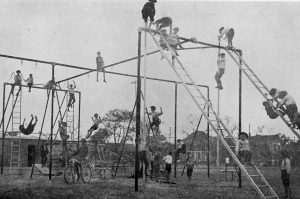
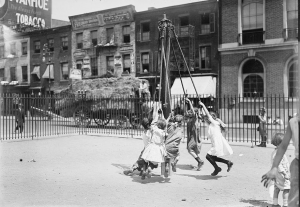 If children today were to see the playground equipment of yesteryear, I wonder if they would want to play on it, thinking it looked intriguing, or if they would simply walk away, saying that it looked boring. I suppose that to them, it probably would be boring. There weren’t any bright colored, shiny things to play on back then, and no mazes to crawl through in search of the prize…the slide at the end. I don’t know if I think that todays playground equipment is better, or worse. Or maybe, it’s just different…more advanced and inventive. I suppose that the playground equipment of earlier years required the child to be more inventive, where today’s maybe doesn’t.
If children today were to see the playground equipment of yesteryear, I wonder if they would want to play on it, thinking it looked intriguing, or if they would simply walk away, saying that it looked boring. I suppose that to them, it probably would be boring. There weren’t any bright colored, shiny things to play on back then, and no mazes to crawl through in search of the prize…the slide at the end. I don’t know if I think that todays playground equipment is better, or worse. Or maybe, it’s just different…more advanced and inventive. I suppose that the playground equipment of earlier years required the child to be more inventive, where today’s maybe doesn’t.
In the 1900s, there were often pipe built structures without paint…not that it seemed to matter to the kids. People have looked back on that equipment and wondered if it was even safe. Well, probably it wasn’t, but when you look at some of the modern day equipment, you wonder the same thing. Kids have been climbing on structures for as long as there have been kids. It’s what they do. If they have nothing to climb on or jump on, they will just jump on the bed. Now tell me you didn’t. I don’t know of one physically capable person who can honestly say they didn’t jump on the bed. In the 1900s, ladders were used to get the kids to the top of the tall structures. I’m sure that was part of the concern, but the rock climbing addition of today, isn’t really any safer, and kids will climb up the outside of a structure whether there is a proper way to get to the top or not. Remember, there isn’t a child alive who hasn’t thought at one point or another, that they were invincible.
Modern playground equipment is often designed as a “fitness” tool. That wasn’t really necessary in years gone by, because there really was no such thing as a “couch potato” then. Kids didn’t have hand held electronic gaming devises to occupy so much of their time, so they went outside and played games. I remember running around the yard until dark, once my homework was done anyway. We never sat still…and that was at home. All we had there was a swing set. The rest was make believe. The school had swings, a slide, and the monkey bars, as 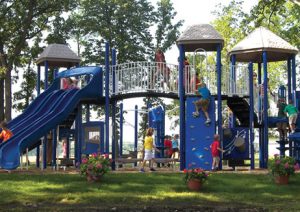
 well as tetherball poles, but no ball if school was out. Still, the school was the place to play…especially in the summer, when playing there didn’t require class time too. While the tall structure with ladders of the 1900s, or even the pole swing of 1910, looked dangerous, my guess would be that there were no more injuries on it than any other type of playground equipment…but, I could be wrong. The way I see it…kids just aren’t notoriously careful.
well as tetherball poles, but no ball if school was out. Still, the school was the place to play…especially in the summer, when playing there didn’t require class time too. While the tall structure with ladders of the 1900s, or even the pole swing of 1910, looked dangerous, my guess would be that there were no more injuries on it than any other type of playground equipment…but, I could be wrong. The way I see it…kids just aren’t notoriously careful.

